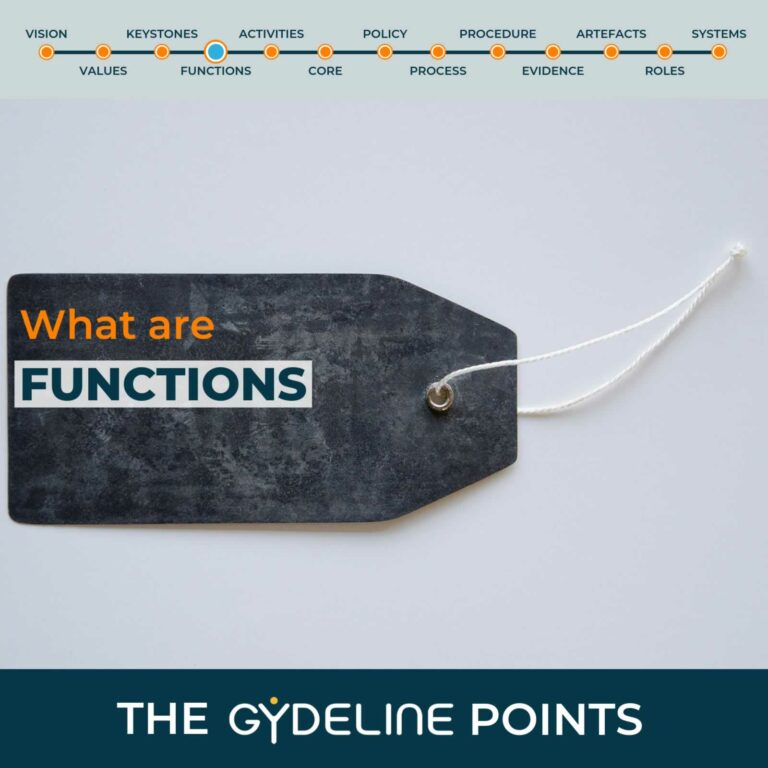What are Business Functions?
Every organisation uses business functions in differing degrees. They may not put a name to the functions or have teams or even individuals to look after them, but they should do them all at one point or another.
A Business Function is mix of defined Activities, skills, experience, knowledge and, usually, some legal requirements. Some of these Functions will be very familiar but others may be a mystery. So, why is it important that you understand all the functions?
Importance of understanding your Functions
In a previous article we introduced the concept of organisational Keystones. In summary, these 7 Keystones include all of the elements which need protecting and are used to keep the business working.
To utilise and safeguard these Keystones you put a ring of business functions around them (see the full Guardian diagram at the end of this article).
If you only focus on the Organisational Functions that are familiar to you, then your Keystones will be be exposed; You may be missing a key legal requirements or losing out on a benefit which the function delivers. Proper attention on these functions and their requirements will reap dividends.
So, what are the Functions we all need in our organisations?
The 17 Business Functions
There are 17 Business Functions in the Gydeline Guardian. Each Function uses and protects one or more Keystones. The primary affected Keystones are shown to the left of the name below. You can read more detail on a Function by clicking on the Read More buttons (where available).

Strategy defines how your organisation plans to achieve its goals, improve, grow and realise its Vision. When using the Strategy function you collect, collate, analyse and interpret information on your market, customers, competition and decide what direction is best for your business.

Every business should keep a close eye on its legal position on matters. This includes getting your terms and conditions documented along with contracts, agreements, trademarks and licenses. The function of protecting your Keystones legally is becoming more and more important.

Looking after the people that you employ is critical to your business success. There is a lot of legislation which covers this function and it needs constant attention to key up with changes in the law and guidance. From recruitment, through management and termination, the Human Resources function controls how you work with your People.

You hopefully have a Vision and Values which drive your organisation. Once you have decided on how you are going to change in the future to improve, grow and achieve your goals you will define Initiatives. These Initiatives may need some task or project management to complete. Bigger challenges may even need programme management, but this function keeps your portfolio of Initiatives under control.

Most organisations have a Product which they provide, sell or deliver to their consumers. This function looks after the lifecycle of the Products that are designed, created, produced, maintained and sold. There may be a thin line between Products and Services (below) but the Product function tends to apply to both.

To make your organisation known to your marketplace you need to undertake activities in the Marketing function. This could be anything from networking to billboard adverts, social media to leaflet distribution, conference stands to website footfall. The Marketing function looks after all these aspects to promote your business.

It’s easy to merge Sales with Marketing, but they do each require distinct skills and activities. Once your marketing has made you known to your Contacts then the Sales function kicks in. Sales engages with leads, understands their needs, educates, negotiates and closes the deal.

You may not produce physical products to sell. Even if you do, then the Services function is concerned with designing and delivering the aftercare, maintenance, repair or consultative activities which the customer may need, or choose, to use.

Most organisations provide help to the consumers of their products and services. The Support function focuses on the provision of that help. Good support of your customers and partner organisations keeps relationships healthy, even when things go wrong.

We all use some form of equipment in our organisations. Whether its a pen, laptop, desk, chair, car, truck or sausage-making machine, it’s looked after by the Equipment function. This function manages the lifecycle of individual items of equipment from purchase to disposal and is key to keeping your organisation safe, compliant and operational.

Facilities are the locations from which your organisation works. You may own your buildings, lease or rent office space, utilise land or shared premises – these are all aspects of managing Facilities. From signing the contract on property through to moving out, the Facilities function keeps control of your workplaces.

Every organisation, whether fully digital or traditional, paper-based, operates with Systems. Systems are the methods that you use to get your work done. A system may be how you use a filing cabinet full of invoices with a piece of software used to do your accounts. Systems need integrating with each other to be the most effective. And getting all your systems working together is what this function does.

If you buy things, then you use the Procurement function, even if you didn’t call it that. Procurement, a term common in larger businesses, is the act of buying products and services from others at a good price. The function helps you specify what you need, find suppliers, manage tenders and quotes and negotiate the best price.

All organisations need to manage money. Income, revenue, costs, expenditure, balance sheets, forecasting, accounts, taxation and annual returns are just some of the aspects of the Finance function. This is usually a very well used business function, but elements can sometimes be overlooked.

The Funding function has been deliberately separated from Finance as it has some specific activities that require attention. This function is concerned with finding and managing the funding of your organisation away from the day-to-day income streams. Think grants, investors, loans and mortgages – that’s Funding.

Many of the previous functions have their own laws and regulations with which they need to abide. The Compliance function focuses on the overarching observance of laws and standards. Compliance provides structure, audit, process and procedure to all functions. It also ensures that functions which work within a common law are consistent and aligned with each other.

Finally is a function that is critical to every organisation. Governance is the function that controls all other functions. At the centre of Governance is decisions… good decisions ideally! Making decisions, recording them and communicating them to all concerned are key to this function. However, this is the function that is so often dismissed or ignored.
Putting your Business Functions to good use
Firstly, it is important for the business functions to be understood. Secondly, be clear who in your company looks after each of the functions. Thirdly make sure that those delivering the function have the knowledge and skills to do it properly.
If you are starting up or run a smaller company then this could feel overwhelming. However, many of these functions can be delivered or, at least, supported by third party organisations. Make sure you take advice and call in the experts when your in-house capability is in doubt.






